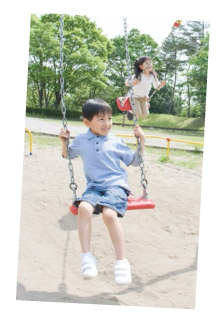Stress is not a uniquely adult experience – even young children can be subject to all kinds of stress, such as parental expectations for a child to perform well in academic and non-academic activities. There is simply no way to eliminate stress and neither should it be viewed in a completely negative light. After all, it is only in adversity that your child will be able to grow and develop. The key is to be on hand to support him when he needs you, and to know when to let him work things out on his own.
As your child expands his social sphere, he will come into contact with more people and he may be exposed to more situations that he may find stressful.
Did you know?
Depending on how your child reacts to it, stress can be either positive or negative. Positive stress provides your child with the energy or motivation to do better but negative stress will have the opposite effect. Remember, every child handles stress differently, for instance, one child may be excited by a ride on a roller coaster while another may break down and refuse to go on the ride.
Signs of stress
Your child may not know when he is feeling stressed and even if he does, he may not be able to adequately convey his feelings of stress or frustration to you. As parents, you will need to be alert to changes in his behaviour that come about as a result of his stress. The most common signs include:
- irritability or moodiness,
- withdrawal from activities that he used to enjoy,
- frets or worries more than usual,
- abrupt behavioural changes where he becomes more clingy/withdrawn, quieter more outspoken, aggressive or any other departure from his usual behaviour,
- more physical complaints such as recurrent headaches / stomach aches, change in appetite, bedwetting,
- the presence of physical complaints in the absence of illness.
Take note that negative behaviour does not necessarily mean that he is facing excessive stress. It is however, a clear indication that there is something wrong. Should you see any such behaviour emerging, it means you need to pay attention and come up with an appropriate response to his behaviour.
How Parents Can Help
Regardless of the cause, stress can build up over time and end with your child displaying inappropriate and unwanted behaviours, make it difficult for them to focus on learning or even manifest as health problems. As a parent, you need to keep track of his behaviour to pinpoint the cause(s) of his stress. By reviewing recent events, you can take appropriate measures to help your child.
Here is what you can do to help your child to cope:
- Encourage him to use positive self-talk – it’s easy for your child to repeat negative thoughts to himself. Teach him to replace his negative thoughts with positive ones. Children have a tendency to mimic adults, so take care not to verbalise negative self-comments in front of him such as “I’m such an idiot for misplacing my keys!” You may be surprised by how much negative self-talk you use, so make it a point to practise positive self talk at every opportunity.
- Teach him to break things down – chances are your child will be stressed whenever he has to perform a task. Guide him by teaching him how to break them down into smaller and more easily managed steps. Taking baby steps will help him to overcome any fears he may have about his ability to start or complete his task. Focus on his efforts rather than the results – just remember that no one is perfect. Anxiety and worry are just some of the feelings that he may feel. At times like this, you should be more supportive and emphasise that everyone makes mistakes and that it is a part of life. This is an excellent opportunity to teach him that it is what he does next that counts, i.e. admitting his mistake and taking the appropriate corrective action.
- Focus on his efforts rather than the results – just remember that no one is perfect. Anxiety and worry are just some of the feelings that he may feel. At times like this, you should be more supportive and emphasise that everyone makes mistakes and that it is a part of life. This is an excellent opportunity to teach him that it is what he does next that counts, i.e. admitting his mistake and taking the appropriate corrective action.
- Let him take some time out – all work and no play makes Jack a dull boy – everyone needs a little break from the daily grind, even children. Many children are often subject to not only academic and extracurricular activities in school but also to supplementary classes out of school hours and during weekends. Keep an eye on him and whenever he seems stressed or flustered, it is time for a break from his routine. Find activities that you know he enjoys or even new ones which can be relaxing.
- Teach him how to stay calm and focused – help him find a way to centre himself and keep calm such as listening to music, taking a walk, jogging, yoga, or anything positive that works. Do try to avoid depending on electronic gadgets as the disadvantages will probably outweigh the benefits.

Not all stress is bad
Despite the negative connotations of stress, moderate amounts can actually be good. It serves as a form of motivation that will keep your child striving for excellence in whatever he embarks on. The key to preventing stress from overwhelming him is in successfully managing his response to stress. You will find that this is a very useful skill that will serve him well into his adulthood. Lastly, if you have done everything you can yet your child’s stress still continues to be a major concern, please seek the services of a trained professional such as his paediatrician, a psychologist, or a child psychiatrist if need be.
An educational contribution by Malaysian Paediatric Association.







Comments